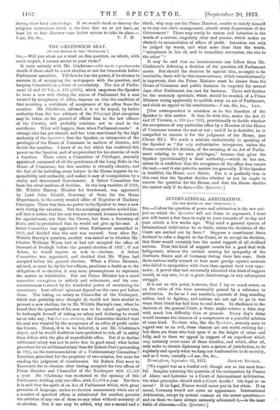INTERNATIONAL ARBITRATION.
[To THE EDITOR OH THE " SPECTATOlt.-] SIR,—Unless the question of peace and arbitration is the one sub- ject on which the Spectator will not listen to argument, I trust you will insert a few lines in reply to your remarks of to-day and your article a few weeks ago. Why need a general system of International Arbitration be so futile, unless the decisions of the Court are carried out by force ? Suppose a constituent State declined to refer a dispute to the Court, or to accept its decision, that State would certainly lose the moral support of all civilised nations. That this kind of support counts for a good deal with belligerents, witness the evident craving for sympathy of the Northern States and of Germany during their late wars. Both these nations really seemed to bear more grudge against neutrals who failed to sympathise with them than against their very oppo- nents. A power that had universally alienated this kind of support would, at any rate, be at a great disadvantage in any subsequent struggle.
It is not on this point, however, that I lay so much stress, as on the value of the time necessarily gained by a reference to arbitration. As far as I can recollect, quarrels of long standing seldom lead to fighting, and nations are not apt to go to war when their blood has had time to cool down. In obedience to the decision of the general Court, a State might retrace a false step with much leas difficulty than at present. Every day's delay would increase the chances of a compromise or a peaceful solution of some kind. To those who, like the Spectator, scarcely seem to regard war as an evil, these chances are not worth striving for ; but there are those who look upon it as the height of crime and folly, and to these we appeal in support of an expedient which may certainly avert some of these troubles, and which, after all, only seeks to elevate diplomacy into a system of jurisdiction, to do regularly and openly what we keep our Ambassadors to do secretly, and as it were, casually.—I am, Sir, &c., [We regard war as a fearful evil, though not as the most fear- ful. Imagine referring the question of the reclamation by France of Alsace and Lorraine to a Court of International Arbitration. On what principles should such a Court decide ? On legal or on moral ? If on legal, France would never put in her claim. If on moral, Germany would not enter an appearance. International Arbitration, except by mutual consent on the minor questions,— and on these we have always earnestly advocated it,—is the most futile of chimeras.—ED. Spectator.]






























 Previous page
Previous page